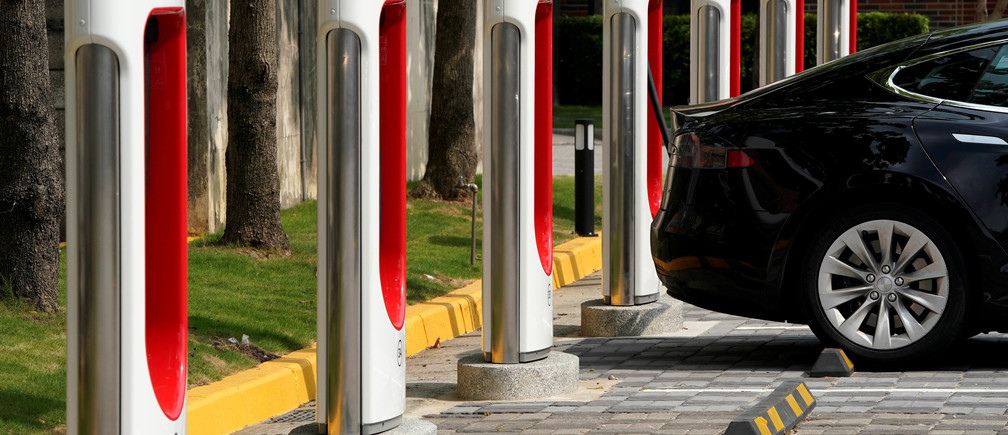[caption id="attachment_1003733365" align="aligncenter" width="475"]
 Electric Vehicle Credit: World Economic Forum
Electric Vehicle Credit: World Economic Forum[/caption]
SWITZERLAND – With the rising importance of batteries in reducing the world’s carbon footprint, the
Global Battery Alliance has designed 10 guiding principles to foster the creation of a sustainable battery chain by 2030.
At this year’s annual general meeting of the World Economic Forum, 42 organizations have agreed on these principles with signatories from the mining, chemicals, battery, automotive and energy industries.
The principles include productivity and recycling considerations, emissions transparency and reduction, job creation and skills development, eliminating child and forced labour, health and environmental protection and supporting responsible trade.
Implementation will be based on existing standards, such as the Organization for Economic Development’s Due Diligence Guidance.
“We all need batteries to power the clean revolution. However, we must ensure violations of human rights do not occur anywhere in the value chain, that local communities benefit and that battery production is sustainable,” Dominic Waughray, the managing director of the World Economic Forum said in a release. “These guiding principles are an important first step to build a value chain that can deliver on this promise while supporting societies and economies at the same time.”
Signatories include Volvo, Audi, BMW, Eurasian Resources Group, Johnson Matthey, the Democratic Republic of the Congo, Chile’s SQM, the World Bank Group, Trafigura and Volkswagen.
The Global Battery Alliance has published the “A vision for a sustainable battery chain by 2030” document with the 10 guiding principles as the suggested first step in creating a responsible battery chain. The initial commitments are to guide the development of a global digital battery information disclosure system, the “Battery Passport”.
For more information, visit
www.WeForum.org.

 Electric Vehicle Credit: World Economic Forum[/caption]
SWITZERLAND – With the rising importance of batteries in reducing the world’s carbon footprint, the Global Battery Alliance has designed 10 guiding principles to foster the creation of a sustainable battery chain by 2030.
At this year’s annual general meeting of the World Economic Forum, 42 organizations have agreed on these principles with signatories from the mining, chemicals, battery, automotive and energy industries.
The principles include productivity and recycling considerations, emissions transparency and reduction, job creation and skills development, eliminating child and forced labour, health and environmental protection and supporting responsible trade.
Implementation will be based on existing standards, such as the Organization for Economic Development’s Due Diligence Guidance.
“We all need batteries to power the clean revolution. However, we must ensure violations of human rights do not occur anywhere in the value chain, that local communities benefit and that battery production is sustainable,” Dominic Waughray, the managing director of the World Economic Forum said in a release. “These guiding principles are an important first step to build a value chain that can deliver on this promise while supporting societies and economies at the same time.”
Signatories include Volvo, Audi, BMW, Eurasian Resources Group, Johnson Matthey, the Democratic Republic of the Congo, Chile’s SQM, the World Bank Group, Trafigura and Volkswagen.
The Global Battery Alliance has published the “A vision for a sustainable battery chain by 2030” document with the 10 guiding principles as the suggested first step in creating a responsible battery chain. The initial commitments are to guide the development of a global digital battery information disclosure system, the “Battery Passport”.
For more information, visit
Electric Vehicle Credit: World Economic Forum[/caption]
SWITZERLAND – With the rising importance of batteries in reducing the world’s carbon footprint, the Global Battery Alliance has designed 10 guiding principles to foster the creation of a sustainable battery chain by 2030.
At this year’s annual general meeting of the World Economic Forum, 42 organizations have agreed on these principles with signatories from the mining, chemicals, battery, automotive and energy industries.
The principles include productivity and recycling considerations, emissions transparency and reduction, job creation and skills development, eliminating child and forced labour, health and environmental protection and supporting responsible trade.
Implementation will be based on existing standards, such as the Organization for Economic Development’s Due Diligence Guidance.
“We all need batteries to power the clean revolution. However, we must ensure violations of human rights do not occur anywhere in the value chain, that local communities benefit and that battery production is sustainable,” Dominic Waughray, the managing director of the World Economic Forum said in a release. “These guiding principles are an important first step to build a value chain that can deliver on this promise while supporting societies and economies at the same time.”
Signatories include Volvo, Audi, BMW, Eurasian Resources Group, Johnson Matthey, the Democratic Republic of the Congo, Chile’s SQM, the World Bank Group, Trafigura and Volkswagen.
The Global Battery Alliance has published the “A vision for a sustainable battery chain by 2030” document with the 10 guiding principles as the suggested first step in creating a responsible battery chain. The initial commitments are to guide the development of a global digital battery information disclosure system, the “Battery Passport”.
For more information, visit
Comments